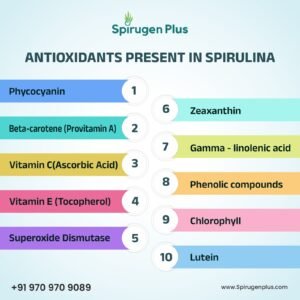Unlocking Health Benefits
Spirulina, a blue-green algae, is celebrated as a superfood for its exceptional nutrient profile. Among its numerous health-promoting compounds, the antioxidants in spirulina stand out for their ability to combat oxidative stress and support overall well-being. In this blog, we will explore the key antioxidants found in spirulina and their remarkable effects on body health.

Key Antioxidants in Spirulina :
1) Phycocyanin
Role: Phycocyanin is a pigment-protein complex unique to spirulina, responsible for its vibrant blue-green color.
Benefits: It has powerful anti-inflammatory and antioxidant properties, helping to neutralize free radicals and reduce oxidative stress.
2) Beta-Carotene (Provitamin A)
Role: Beta-carotene is a precursor to vitamin A, essential for vision, immune function, and skin health.
Benefits: As an antioxidant, beta-carotene protects cells from damage and supports the body’s defense against chronic diseases.
3) Vitamin C (Ascorbic Acid)
Role: Vitamin C is a vital nutrient for collagen synthesis, immune function, and skin health.
Benefits: It acts as a potent antioxidant, safeguarding cells from oxidative damage and enhancing the body’s ability to fend off infections.
4) Vitamin E (Tocopherol)
Role: Vitamin E is crucial for protecting cell membranes from oxidative damage.
Benefits: It supports skin health, boosts immune function, and acts as a powerful antioxidant to combat free radicals.
5) Superoxide Dismutase (SOD)
Role: SOD is an enzyme that catalyzes the dismutation of superoxide radicals into oxygen and hydrogen peroxide.
Benefits: It plays a critical role in reducing oxidative stress, protecting cells from damage, and promoting longevity.
6) Zeaxanthin
Role: Zeaxanthin is a carotenoid that accumulates in the retina of the eye.
Benefits: It protects against oxidative stress and harmful blue light, reducing the risk of age-related macular degeneration and cataracts.
7) Gamma-Linolenic Acid (GLA)
Role: GLA is an omega-6 fatty acid with anti-inflammatory and antioxidant properties.
Benefits: It supports skin health, reduces inflammation, and may help with conditions like eczema and arthritis.
8) Phenolic Compounds
Role: Phenolic compounds are a diverse group of plant-based chemicals with antioxidant properties.
Benefits: They help neutralize free radicals, reduce inflammation, and protect against chronic diseases.
9) Chlorophyll
Role: Chlorophyll is the green pigment in plants responsible for photosynthesis.
Benefits: It has detoxifying properties, supports liver health, and acts as an antioxidant to protect cells from damage.
10) Lutein
Role: Lutein is a carotenoid that, like zeaxanthin, is found in high concentrations in the retina.
Benefits: It supports eye health, protects against oxidative stress, and reduces the risk of age-related eye diseases.
Effects of Spirulina’s Antioxidants on Body Health :
1. Combatting Oxidative Stress
Oxidative stress occurs when there is an imbalance between free radicals and antioxidants in the body. The antioxidants in spirulina help neutralize free radicals, reducing oxidative stress and preventing cellular damage. This protection is crucial for maintaining overall health and preventing chronic diseases.
2. Supporting Immune Function
Antioxidants like vitamin C, vitamin E, and beta-carotene bolster the immune system by protecting immune cells from oxidative damage. A robust immune system is essential for fighting off infections and illnesses.
3. Promoting Skin Health
Spirulina’s antioxidants, particularly beta-carotene, vitamin E, and GLA, support skin health by reducing inflammation, protecting against UV damage, and promoting collagen synthesis. These effects contribute to healthier, more radiant skin.
4. Enhancing Eye Health
Carotenoids like zeaxanthin and lutein accumulate in the retina and protect against oxidative stress and blue light damage. Regular consumption of spirulina can help reduce the risk of age-related macular degeneration and other eye conditions.
5. Reducing Inflammation
Chronic inflammation is linked to numerous health issues, including heart disease, arthritis, and cancer. The anti-inflammatory properties of spirulina’s antioxidants, such as phycocyanin and GLA, help reduce inflammation and support overall health.
6. Supporting Cardiovascular Health
Oxidative stress and inflammation are key contributors to cardiovascular disease. Spirulina’s antioxidants help protect blood vessels, reduce cholesterol levels, and improve blood pressure, promoting heart health.
Conclusion
Spirulina’s impressive array of antioxidants offers a wide range of health benefits, from reducing oxidative stress and inflammation to supporting immune function and promoting skin and eye health. Incorporating spirulina into your diet can be a powerful way to enhance overall well-being and protect against chronic diseases. Embrace the power of this remarkable superfood and experience the transformative effects of its antioxidants on your health.
SPIRUGENPLUS
EMPOWERING YOUR WELLNESS JOURNEY

